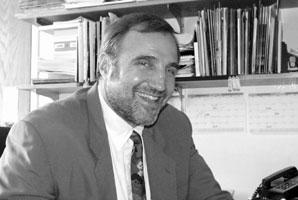 |
|
||
|
|||
Hackie Reitman -- just call him the fight doctor
By Brian Fitzgerald
First, do no harm. That's the basic premise in the practice of medicine.
So when you see a doctor going into the boxing ring, you've got to wonder:
how effectively can healing hands be used to hit opponents?
 |
|
| Orthopedic surgeon Harold Reitman (CAS'72, MED'74). Photo by Steve McGettrick | |
Just ask anyone who has fought Harold "Hackie" Reitman (CAS'72,
MED'74), a 52-year-old orthopedic surgeon who has 13 professional victories
(11 by knockout), 7 losses, and 6 draws. And he still packs a wallop.
Last summer the Plantation, Fla., resident defeated Tommy Muccigrosso,
a fighter half his age, in a bout in the Virgin Islands.
A doctor who boxes. Does Reitman see this as a contradiction? "I
see similarities," he says. "In surgery, like pro heavyweight
boxing, there is no room for error. There are no excuses, whether you're
in the operating room or a boxing ring. And the stakes, as in surgery,
are very high. Also, preparation is key. Motivation, character, hard work,
discipline, consistency, all of these things come to mind when I think
of surgery -- and when I think of boxing."
Reitman, who delivers several lectures at the BU School of Medicine every
year, was at the school on September 23 to give a two-hour talk on the
clinical aspects of upper extremity anatomy. Ignoring his suit and tie,
you can picture him as a heavyweight fighter. He is certainly rugged-looking
and muscular enough to make it a good idea to avoid getting in an argument
with him over a parking space. But it's difficult to imagine him using
his upper extremities to dispose of 26-year-old Muccigrosso, a two-time
Florida Golden Gloves heavyweight champion, in a third-round TKO upset
victory. Muccigrosso was 6-1 as a professional at the time, and had a
19-2 amateur record -- 14 of those victories by knockout. He also had
a reputation as a vicious street-style fighter.
Then again, Reitman trains hard, and he can punch hard. He was also a
Golden Gloves heavyweight champion, in Massachusetts. While a 21-year-old
medical student at BU, fighting out of Connolly's Gym in South Boston,
he was offered a $100,000 signing bonus by legendary Boston promoter Sam
"Subway" Silverman. Silverman told Reitman that he would someday
make more money in one day in the ring than he would in his whole career
as a doctor. "That was in 1971," says Reitman. "That year,
Ali and Frasier fought, and it was the first time two boxers would receive
more than a million dollars each for a match." He decided, however,
to complete his education first. Boxing would have to come later. "People
said that I would be too old," he laughs. "But I was 38 when
I turned pro."
|
|
|
|
Hackie Reitman: still boxing at 52. Photo courtesy of Gerrits Leprechaun Boxing |
|
Reitman was 37 when he came up with the idea of boxing for charity. In
1987 his four-year-old daughter, Rebecca, needed two operations to repair
small blood vessels in her brain. In the waiting room at the Mayo Clinic
in Jacksonville, Fla., he and another parent tried to think of ways to
raise money for sick children. They eventually set up a charity match
in Chicago, pitting Reitman against Circuit Court Justice Mike Bolan --
another boxer who just couldn't get the sport out of his system -- for
the benefit of St. Jude's Hospital for Crippled Children. Reitman knocked
out Bolan in the third round.
Boxing professionally a year later, Reitman showed that he could still
hit hard. In his second pro fight, he knocked Brian Spizer unconscious
for four minutes. "Fortunately, he got up," recalls Reitman.
"He was all right." Then much of the boxing world watched in
amusement as George Foreman attempted a comeback in 1989 at age 40. But
Reitman wasn't laughing. "Scientifically, studies show that your
strength and power is the last thing to go," he says. "You lose
your speed and reflexes first." Foreman proved that pure strength
can go a long way. In 1994, the 45-year-old Foreman, always a power puncher,
became the oldest man in history to win the heavyweight championship of
the world.
Reitman knows that his comeback might eventually end without a world title,
but he loves the sport that enables him to spar with the likes of Roberto
Duran, Hector "Macho" Comacho, and Trevor Burbick. "And
I tell all my patients about the importance of proper diet, nutrition,
and exercise," says Reitman. "Training for boxing matches is
how I get my exercise." He plans to continue to win, and to donate
all of his prize money to children's charities.
"I'm going to keep fighting," he says. "I'm unrealistic
that way. In high school, my advisor told me I wasn't smart enough to
get into an accelerated medical program like the one at BU, but I am unrealistic
about a lot of things."
![]()
27 September 2002
Boston University
Office of University Relations
